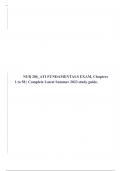NUR 206_ATI FUNDAMENTALS EXAM, Chapters
1 to 58 | Complete Latest Summer 2023 study guide.
HP
[COMPANY NAME] [Company address]
,ATI FUNDAMENTALS EXAM
1. CHAPTER 1: HEALTH CARE DELIVERY SYSTEMS
Key:
A. Components of Health care systems
- Most likely on test
a. Participants - Motivational quotes
1. Consumers- clients
2. Providers
a. Licensed providers: registered nurses, license practical (or vocational) nurses (LPN),
advanced practice nurses (APN), medical doctors, pharmacists, dentists, dietitians,
physical/respiratory/occupational therapists, etc
b. Unlicensed providers: assistive personal
b. Settings
1. Hospitals, homes, skilled nursing, assisted living, schools, etc
c. Regulatory Agencies
1. US department of Health and Human Services
2. US Food and Drug Administration (FDA)
3. State and local public health agencies
4. State licensing boards
a. Determines laws/regulations that govern nursing in their state
b. ensure health care providers and agencies comply with state regulations
c. Issue/revoke nursing license
i. Nurses need a license in every state they practice in
5. Joint Commission (JCAHO)
a. Set quality standards for accreditation of health care facilities
6. Professional Standards Review Organizations- monitor health care services provided
d. Healthcare financing Mechanisms
1. Public federally funded programs
a. Affordable Care Act (Obamacare)
i. Increases access to healthcare for all individuals
ii. Decreasing healthcare costs
iii. Providing opportunities for uninsured to become insured at an affordable cost
b. States Children’s Health Insurance
i. Covers uninsured children up to 19 years old at a low cost to parents
, Don’t stop until you are proud
c.
MEDICARE MEDICAID
Eligibility: >65 years old OR on disability Eligibility: low socioeconomic status, no
for more than 2 years OR have ALS OR on insurance
dialysis Federally and state funded
Part A: inpatient hospital, limited Individual states determine eligibility
skilled nursing care, home health requirements
care
(hospital insurance)
Part B: outpatient care, diagnostic
services, OT/PT (medical insurance)
Part C: combination of parts A and B,
optional private insurance
(Medicare advantage plan)
Part D: prescription drugs
(medications)
e. Levels of Health Care
Preventative Focuses on educating and equipping clients to reduce or control risk
factors for disease
Primary Emphasizes health promotion and includes prenatal, well-baby care,
family planning, nutrition counseling, disease control
Secondary Diagnosis and treatment of acute illness and injury
Tertiary Provision of specialized and highly technical care
Restorative Intermediate follow-up care for restoring health and promoting self-
care
Continuing Addresses long-term or chronic health care needs over a period of time
2. CHAPTER 2: THE INTERPROFESSIONAL TEAM
A. Interprofessional Personnel (non-nursing)
Spiritual Support Staff Provides spiritual care (pastors, rabbis, priests)
Registered Dietitian Assess/plans for/educates regarding nutrition needs
Laboratory technician Obtains specimens of body fluids, and performs diagnostic tests
Occupational therapist Focuses on patient’s independence and regain activities of daily living
(ADL) skills
Pharmacist Provides and monitors meds
2
, Physical Therapist Focuses on increasing musculoskeletal function (especially lower
extremities), to maintain mobility
Provider Assess/diagnose/treat diseases or injury, includes doctors, APNs,
physician’s assistant
Radiologic technologist Positions client and performs x rays and other imaging procedures for
providers to review for diagnosis of disorders of various body parts
Respiratory therapist Evaluates respiratory status and provides respiratory treatments
including oxygen including oxygen therapy, chest physiotherapy,
inhalation therapy, and mechanical ventilation
Social worker Works with clients and families by coordinating inpatient and
community resources to meet psychosocial and environmental needs
that are necessary for recovery and discharge
Speech-language Evaluates and makes recommendations regarding the impact of
pathologist disorders or injuries on speech, languages, and swallowing
Ex: patient with dysphagia call speech pathologist for consult
3. CHAPTER 3: ETHICAL RESPONSIBILITIES
A. Ethical Decision Making In Nursing
a. Basic principles of ethics
1. Advocacy- support of client’s health, wellness, safety, privacy, and personal rights
2. Responsibility- willingness to respect obligations and follow through on promises
3. Accountability- ability to answer for one’s own actions
4. Confidentiality- protection of privacy without diminishing access to high-quality care
b. Ethical Principles for client care
Autonomy The right to make one’s own personal decisions, even when those
decisions might not be in that person’s best interest (ex: Jehovah’s witness-
blood transfusion)
Beneficence Action that promotes good for others, without any self interest
Fidelity Fulfillment of promises
Justice Fairness in care delivery and use of resources
Nonmaleficence A commitment to do no harm
Veracity Commitment to tell the truth
c. Ethical Dilemma
1. Problems that involve more than one choice and stem from differences in values and
beliefs of the decision maker
a. A problem is an ethical dilemma when:
i. There is not enough scientific data to solve it
ii. It conflicts between 2 moral imperatives
iii. Answer will have a profound effect on the situation and the client
2. When making an ethical decision:
3




